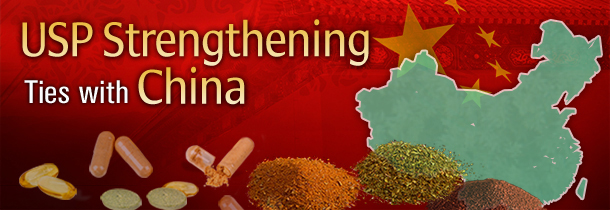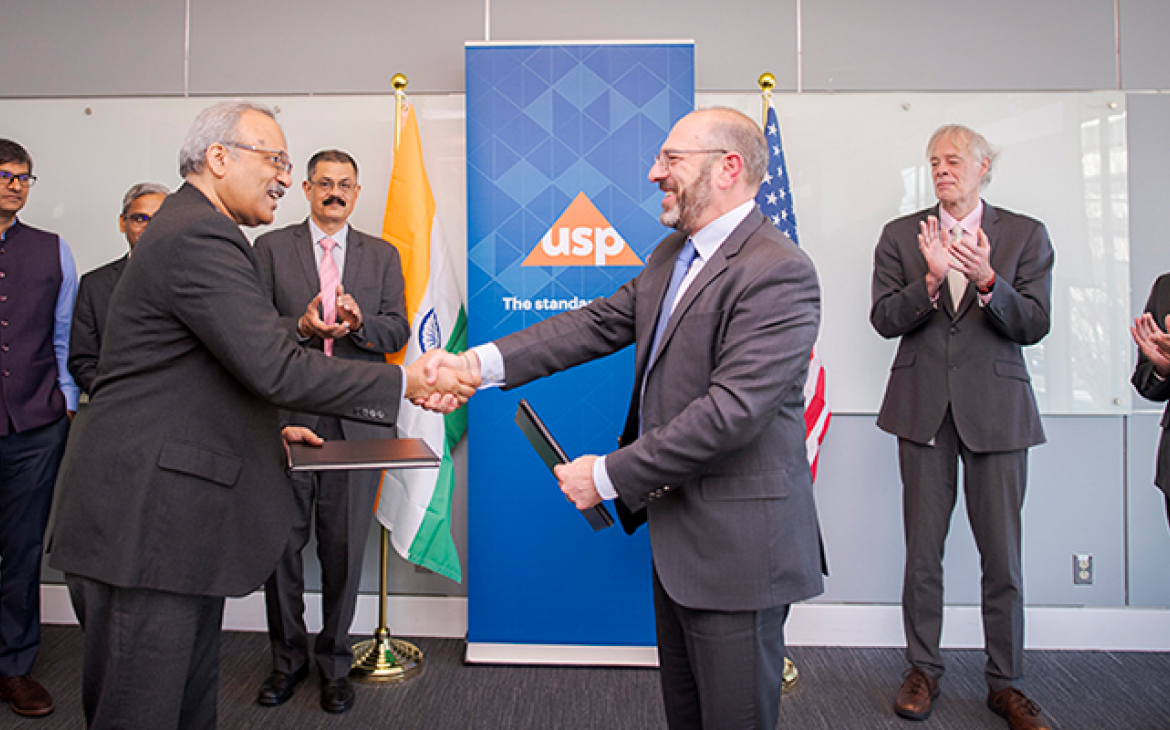
Many of the drug ingredients used in generic medicines around the world are produced in China, and the Chinese government has consistently expressed a desire to help promote quality medicines for the Chinese people as well as for the world at large, which impacts public health at a global level. In fact, according to the U.S. Food and Drug Administration (FDA), as much as 80 percent of active pharmaceutical ingredients (APIs) in drugs marketed in the United States (U.S.) come from other countries, primarily India and China. In recent years, there is also a trend that indicates more and more Chinese companies are exporting drug products to the U.S. market.
Not only are more pharmaceutical ingredients in medicines exported from China today, but food ingredients from this country are also prominent in the U.S. market. USP-China is working collaboratively with China’s local governments and other key stakeholders to advance the quality of medicines and food in China and globally.
Meeting National Leaders
On August 6, USP-China was fortunate to have Dr. Ron Piervincenzi and Dr. Koduru Surendra Nath meet with Mr. Zheng Han, one of the top 25 leaders in China. Mr. Han is a member of the Political Bureau of CPC Central Committee and Party Secretary of Shanghai. He also accompanied Premier Li on his visit to USP-China in September 2014.
Several topics were covered in the meeting with Mr. Han: the benefits of the Free Trade Zone (FTZ) policies to foreign organizations like USP, standards-setting activities for herbal medicines and drugs, government efforts in promoting innovation and R&D, and food quality and global impact.
Dr. Piervincenzi talked about our USP-China’s new Global Center of Excellence for Food and related initiatives. USP is the publisher of the Food Chemicals Codex (FCC) and currently all R&D work in FCC food ingredients is centered in USP-China laboratories. However, USP-China wants to do more and because one of the Chinese government’s priority is food safety, we hosted discussions on the possibility of future projects in capacity building, training in international standards, joint research projects as well as the use of vulnerability assessments for food fraud, an area where USP has made significant progress in the past two years.
Mr. Han highly praised USP’s efforts in food and drug standards-setting activities and showed great interest in our work in the herbal medicines area.
At the end of the meeting, Mr. Han presented a silk book, The Art of War by Sun Tzu, while Dr. Piervincenzi gave him the Chinese translated edition of the Food Chemicals Codex.
Meeting with Wei Zhang (ChP)

On the same day, the USP-China site hosted a meeting with Mr. Wei Zhang, Secretary General of the Chinese Pharmacopoeia Commission (ChP). ChP is a member of the USP Convention. Dr. Piervincenzi and Mr. Zhang (pictured together at right) held a USP-ChP summit to exchange ideas on bilateral collaboration and future action plans. As a key outcome, USP will closely collaborate with ChP to support the upcoming 6th WHO World Pharmacopeias Meeting and ChP Annual Scientific Conference in Suzhou in September 2015.
Meetings with Chinese Media
The week’s activities ended with a full media event and a wonderful opportunity to establish USP-China as a prominent player in the region.
USP-China hosted a media event organized by the Ministry of Commerce. Key state media, such as People’s Daily, China Daily, Xinhua News Agency, China Business News TV, and International Business Journal were present to ask questions about USP and USP-China. Dr. Koduru Surendra Nath, Stephen Gardner, Diana Zhang and I answered their questions.
USP-China has doubled its project output in the food and drug standards in the two years since moving to FTZ and has laid a solid foundation in Shanghai, with potential of collaborations all over China. The media were impressed by USP-China’s achievements. They were also interested in how USP could help China’s manufacturers increase their exports globally.
I sincerely hope that USP-China continues to grow and play an important role in China’s food and medicines quality. As USP approaches its 200th anniversary as a standards-setting organization, I’m very confident that USP-China will increase its activities to meet our stakeholders’ expectations.
Learn more about USP-China and USP’s other global locations,
Bingbing Feng, Ph.D., is vice president and general manager at USP-China.


